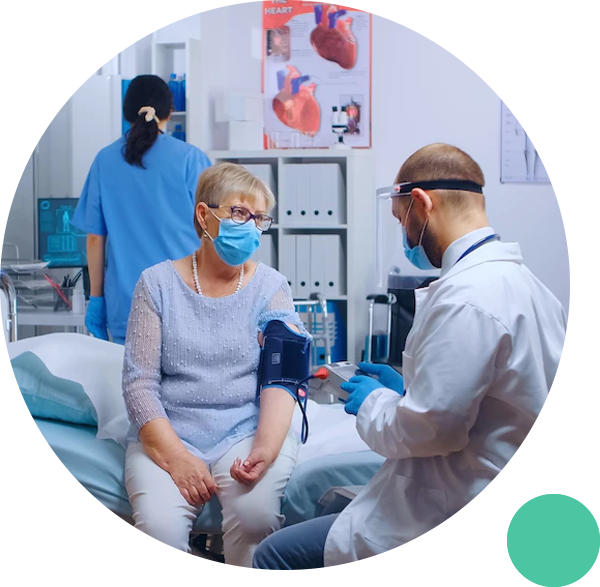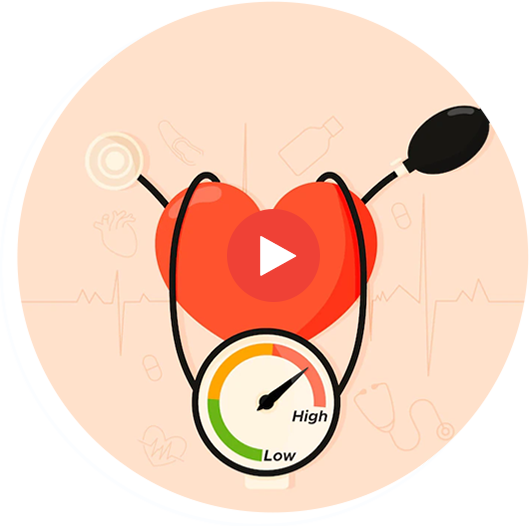-mob.png)
Consult an Online Doctor
For Hypertension Treatments
Book an Appointment for
Only 
Nearly 65 million of the adult population of the US suffers from hypertension or high blood pressure. Not only is the condition life-threatening, but also 1 in 3 people might be unaware of the condition. These statistics make it the ‘silent killer.’ A type of hypertension is essential hypertension, where the exact cause is unknown. A staggering 95% of the US hypertension cases reported are for essential hypertension.
TELMDCARE
What Is
Hypertension?
Normally, a certain pressure allows the blood to circulate throughout the body. But in
hypertension, the pressure exerted on the arterial walls is too high, leading to serious medical
problems.
High blood pressure is a condition that affects the body's main blood vessels. It occurs when
the pressure against the arterial walls I higher than usual.
Blood pressure readings are measured in pairs known as systolic and diastolic. The former
indicates the pressure in the vessels when the heart contracts. On the other hand, the latter
shows the pressure in the vessels when the heart rests between the beats.
If a person has high blood pressure on consecutive days, then it is considered to be a condition
known as hypertension.
TELMDCARE
Risks of Hypertension
Hypertension medically refers to the excessive and consistent force exerted on the arterial walls, weakening them over time. Typically, the risks of hypertension include:
The elevated pressure can also affect blood vessels in the head, causing damage to the brain.
TELMDCARE
Is covered by many popular
insurance plans

TELMDCARE
Symptoms of Hypertension
Hypertension overworks the heart beyond its limits. Without treatment it can cause:
Causes of
Hypertension
Several factors may cause hypertension and the causes may vary from person to person. The causes may include:
Risk Factors
of Hypertension
High blood pressure can be caused by various medical conditions. Having one of these risk factors can raise your risk of developing the condition.
TELMDCARE
Who’s At Risk
of Hypertension?
Fortunately, hypertension can be managed to live a normal life. But the first step is to regularly check blood pressure to maintain a healthy lifestyle. Some people have a higher risk of developing hypertension.
The elevated pressure can also affect blood vessels in the head, causing damage to the brain.

How to Prevent Hypertension
The chances of hypertension can be lowered with a healthy lifestyle and better dietary choices. These lifestyles choices include:
Taking these measures help reduce the likelihood of heart diseases as well.
Foods to Avoid
Introduce items high in fiber, magnesium, calcium, and potassium in your diet. You can find and make an appointment online for a virtual doctor for a hypertension consultation for treatment. Our online doctors at TelMDCare can suggest a treatment plan for hypertension, as well as educate you about a healthy lifestyle and medications they may prescribe.

TELMEDCARE
What we treat
We treat a variety of acute and chronic conditions and provide expert medical advice and guidance for our patients.
Read More
Treatment and Medication
A wide variety of medications are available for hypertension. Your doctor may prescribe medications that may include:
- Diuretics (water pills)
- Beta-blockers
- Calcium channel blockers
- Angiotensin-converting enzyme (ACE) inhibitors
- Angiotensin ii receptor blockers (ARB)
You may be at risk of heart failure due to hypertension. Visit a doctor or get a virtual consult for hypertension online. They may prescribe or adjust your treatment for the particular medications you may need. They can also assist you with regular medication refills.
TELMDCARE
As Seen On

TELMDCARE
Sign Up
Our best online doctors on call ensure that the services we provide are adequate, high quality,
and affordable.
Get in touch with us today for more details or Sign Up for a quick consultation.
$43 SIGN UP
TELMDCARE
Frequently Asked Questions about Hypertension
Although it is not always clear why people have high blood pressure, various factors can affect their condition. Some of these include being overweight or leading a sedentary lifestyle, genetics, and poor diet.
A blood pressure reading is done by measuring the force of blood against the walls of the arteries. It is written as either systolic pressure, which is the pressure at the point of your heart beating, or diastolic pressure, which is the pressure at the point of your heart stopping between the beats.
According to the Joint National Committee on High Blood Pressure, blood pressure can be categorized into different categories. For instance, normal blood pressure is measured at around 120 or less. On the other hand, elevated blood pressure is measured at 120 or higher. Hypertension in stage 1 is characterized by a systolic pressure of 130 or greater and a diastolic pressure of 80-89.
High blood pressure can lead to various health conditions. One of these is atherosclerosis, which is a type of disease that occurs when a buildup of fat and plaque on the walls of blood vessels blocks blood flow. This condition can be caused by the stress that high blood pressure puts on the walls. High blood pressure can also lead to various heart conditions. Some of these include heart failure, which is a type of condition that occurs when the heart can't pump the blood properly. Ischemic heart disease, which is a type of disease that occurs when the heart tissue doesn't get enough oxygen and blood, is another type of condition that can be caused by high blood pressure. High blood pressure can also lead to kidney disease, which is a type of condition that occurs when the body can't properly remove wastes from the body. High blood pressure can also lead to stroke. It can cause the walls of blood vessels to break down, which could lead to the formation of clots or blockages. Eye disease is another condition that can be caused by high blood pressure.
Since high blood pressure doesn't usually have symptoms, people must regularly get checked for it. A medical professional can diagnose this condition during a routine health check. Your doctor will use a blood pressure cuff to check your blood pressure, and it's important to note the lower and higher readings. If your blood pressure is very high, then you may have other symptoms such as severe headaches, fatigue, shortness of breath, and poor exercise tolerance.
Maintaining a healthy lifestyle can help manage high blood pressure. Doctors often suggest these changes before prescribing drugs. Lifestyle changes can also be helpful for people with high blood pressure, which is characterized by readings of more than 120. One of the most important steps that people can take to improve their health is to stop smoking. Doing so can help lower their blood pressure. Another important step that people can take to improve their health is losing weight. For individuals who are overweight, they must work with their doctor to develop a weight loss plan that's designed to reach their ideal weight. Getting enough salt from your diet is also important to lower blood pressure. Doing so can help decrease the amount of salt that's in your body. Also, regular exercise can help lower blood pressure. Drinking alcohol can also increase blood pressure, which is why women should limit their alcohol consumption to one drink per day, while men should limit their intake to two drinks. High blood pressure can be caused by emotional factors. Some studies suggest that certain types of relaxation techniques, such as yoga, meditation, and therapy, can help lower blood pressure. Your doctor may suggest medication if lifestyle changes aren't enough to lower blood pressure. High blood pressure medications don't cure hypertension, but they can help keep it in check. There are various types of drugs that can be used to manage this condition, such as water pills or diuretics. One type of drug that can help lower blood pressure is beta-blockers, and is commonly used by people with heart disease. These can make the heart beat slower and reduce the pressure on the arterial walls. Another type of drug that can help lower blood pressure is angiotensin-converting enzyme inhibitors. These can block the effects of certain factors that cause the blood vessels to narrow. These drugs can also lower the risk of stroke, heart disease, and kidney disease. They are especially helpful for people with diabetes and heart disease. Angiotensin II receptor blockers work similarly to ACE inhibitors. ARBs can dilate and relax the arteries, which helps lower blood pressure. Combined with relaxing arteries, alpha-blockers can reduce the force of the heartbeat, as well as slow down the heart rate. These drugs are also known to block the signals sent by the brain to the body. Vasodilators work by directly targeting the muscles in the walls of blood vessels.



